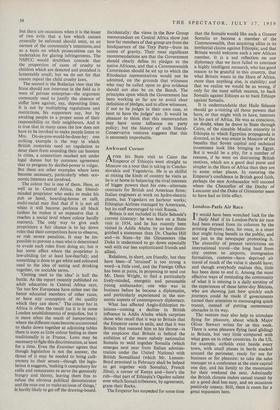Awkward Corner
AFTER his State visit to Cairo the Emperor of Ethiopia went straight to Moscow on a tour that is taking in Czecho- slovakia and Yugoslavia. He is as skilful at mixing the kinds of country he visits as he is at home in balancing the rival interests of bigger powers than his own—alternate contracts for British and American firms; Italian engineers at work on hydro-electric plants, but Yugoslays on harbour works; Ethiopian Airlines managed by Americans, but its staff encouraged to visit Russia.
Britain is not included in Haile Selassie's current itinerary: he was here on a State visit in 1954, and he has recently been visited in Addis Ababa by no less distin- guished a statesman than Dr. Charles Hill and—in State—by the Gloucesters (the Duke is understood to go down especially well with our less sophisticated friends and allies).
Relations, in short, are friendly, but they have been—if 'strained' is too strong a word—a little cool, and the Foreign Office has been at pains, in proposing to send out Mr. Denis Wright, to find a particularly lively-minded, energetic and personable young ambassador; one who was in business before he became a diplomatist, and particularly experienced in the eco- nomic aspects of contemporary diplomacy.
What has affected Anglo-Ethiopian re- lations—causing a decline in British influence in Addis Ababa which surprises those who recall that it was to Britain that the Emperor came in exile, and that it was Britain that restored him to his throne—is the suspicion that Britain is behind the ambition of the more naïvely nationalist Somalis to weld together Somalia (which emerges next year from Italian adminis- tration under the United Nations) with British Somaliland (which Mr. Lennox- Boyd promised in February shall be helped to get together with Somalia), French Jibuti, a corner of Kenya and—here's the rub—that part of Ethiopia's Ogaden salient over which Somali tribesmen, by agreement, graze their flocks.
The Emperor has suspected for some time that the Somalis would like such a Greater Somalia to become a member of the Commonwealth, thus acquiring allies in its territorial claims against Ethiopia; and that Britain would welcome such a new African member. It is a sad reflection on our diplomacy that we have failed to convince a highly intelligent monarch, who has good reason to be grateful to this country, that what Britain wants in the Horn of Africa, more than anything else, is stability; and that we realise we would be as wrong, if only for the most selfish reasons, to back Somalis against Ethiops as to back Ethiops against Somalis.
It is understandable that Haile Selassie should go a-visiting all those powers that have, or that might wish to have, interests in his part of Africa. He was as conscious, no doubt, when he drove in State through Cairo, of the sizeable Muslim minority in Ethiopia to which Egyptian propaganda is directed, as he was aware in Moscow of the benefits that Soviet capital and technical investment look like bringing to Egypt. But it would be a pity, for a number of reasons, if he went on distrusting British motives, which are a good deal purer and simpler in the Horn of Africa than they are in some other places. In restoring the Emperor's confidence in British good faith, perhaps the new Ambassador will succeed where the Chancellor of the Duchy of Lancaster and the Duke of Gloucester seem to have had so little effect.






































 Previous page
Previous page